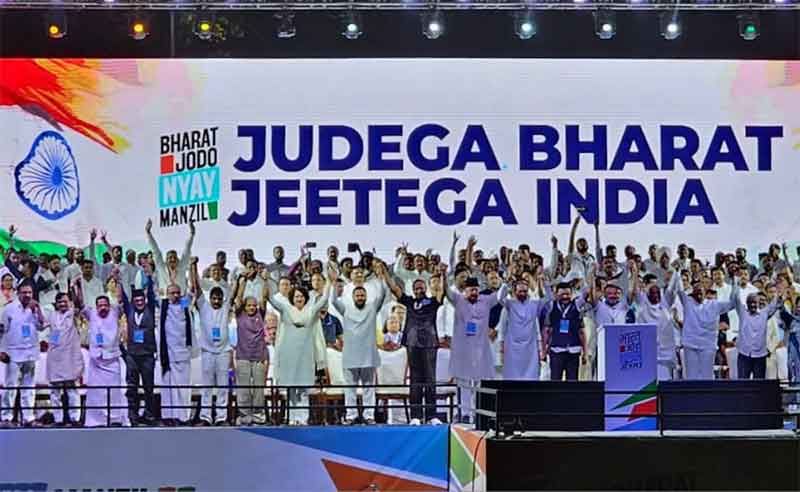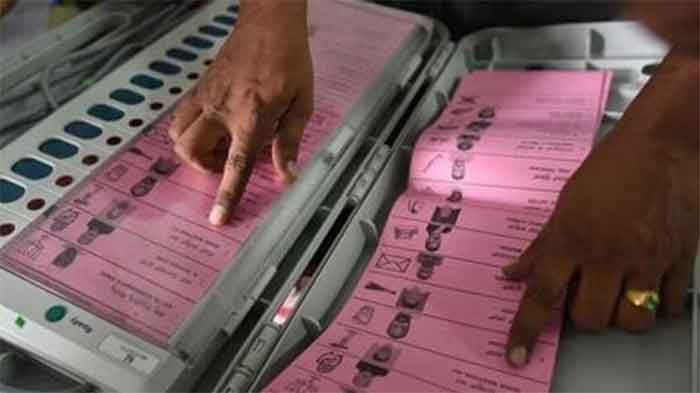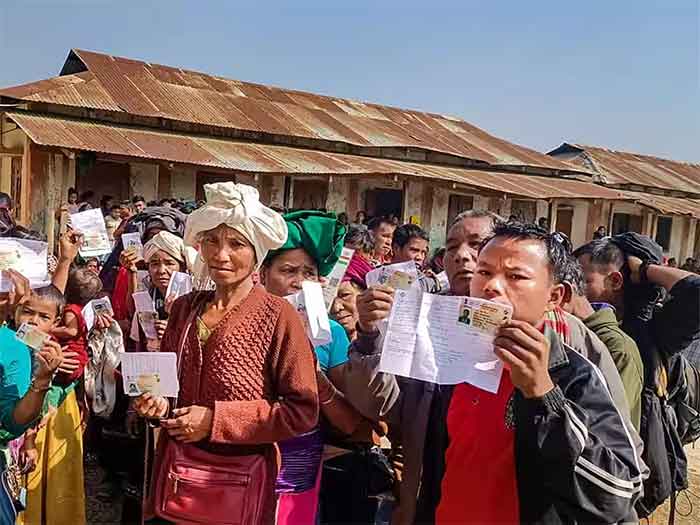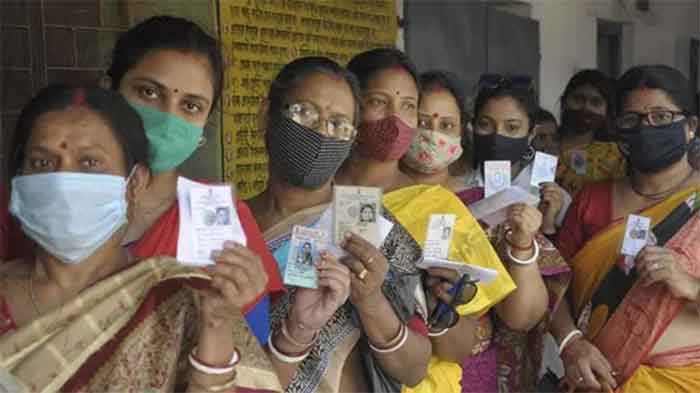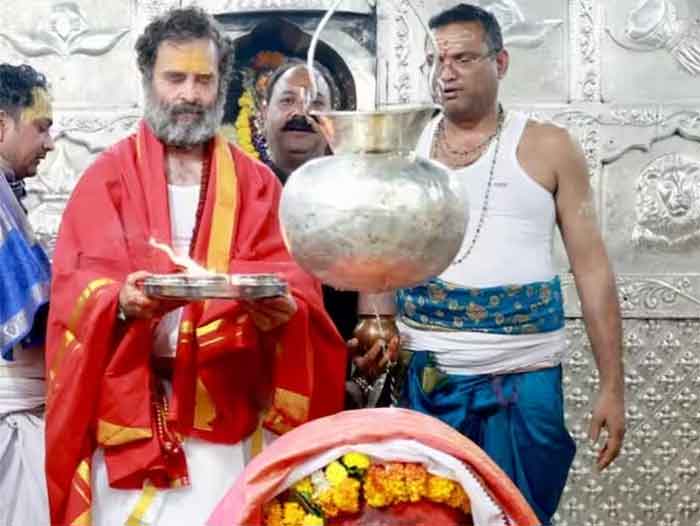
There are always wins and losses in politics, but in the current politics, Congress’s defeat in the states of Rajasthan, Madhya Pradesh and Chhattisgarh holds special significance. And that is because this defeat of Congress is also possible in the Lok Sabha elections of 2024. I am not an astrologer, although an astrologer’s prediction may not necessarily turn out to be true, but my prediction would hardly turn out to be wrong, because I am giving my conclusion after conducting the post-mortem of the defeated Congress.
Even though the President of Congress party is Mallikarjun Kharge, the leadership rests with Rahul Gandhi. I want to compare the class status of Rahul Gandhi with the Nawabzada of my city, Kazim Ali alias Naved Mian, who has never lived as a common man. He has his own royal class, and his sensibilities are for and from that same royal class. By issuing regular press notes in the elections of these four states, he gave support to the descendants of the former rulers, namely Vasundhara Raje of Gwalior and Maharani of Dholpur, Princess Diya Kumari of Jaipur, Maharani Kalpana Devi, wife of the Maharaja of Kota, Princess Siddhi Kumari of Bikaner, Kunwar Natwar Singh’s son Jagat Singh and Maharana Pratap’s descendant Vishvaraj Singh Mewar have been congratulated on their victory. Rahul Gandhi also has a royal elite group of upper castes, whom he cares about, and considers them as his friends, even though they are not with him. Rahul Gandhi talks about caste census. He had announced that a caste census would be conducted if Congress comes to power. But his upper caste friends do not want caste survey. He is neither in support of the empowerment of Dalits nor of backward castes. They are also not in favour of the empowerment of Scheduled Tribes of this country, and nor do they want social and economic empowerment of minorities, especially Muslims. They are not with any social change.
But Rahul Gandhi talks about soft Hindutva to please the upper castes and Brahmins, and forgets that whether Hindutva is hard or soft, it is only supporting the Hindutva of RSS and BJP. His upper caste friends are not with the politics of soft Hindutva, but that of hardline Hindutva, and they also know that Congress cannot do its politics better than BJP does. Shouldn’t Rahul Gandhi be asked what is the use of his soft Hindutva politics, which keeps a blind eye to the undemocratic and illegal politics of aggressive Hindutva being carried out in the Gyanvapi andthe Idgah issue of Mathura? Of what use is this soft Hindutva of his, which did not protest or took any legal measures to stop the frenzied Hindu action of destroying these historical heritages in the name of myths? Why after all? Why is he letting all this happen? Is it not their democratic responsibility? The answer is only that he does not want to anger the upper castes. But Rahul Gandhi could not stop his upper caste friends from being angry over the comments of some Congress leaders on Sanatan Dharma.
Rahul Gandhi does not know or does not want to know that in Hindutva which his upper caste friends prefer, development for non-Hindus and that of the backward classes is not possible. Doesn’t he know the history of their governments? The Congress ruled for forty years by instilling fear of the RSS among the minorities, especially the Muslims, and these rulers of the Congress were the same upper castes and Brahmins who are with the BJP today. That is why the Congress governments never allowed the economic empowerment of Muslims. Even today the Muslim Pasmanda community is the most illiterate and poor. Were those Congress governments not responsible for this, whose rulers were upper caste people and Brahmins? Why did Congress governments not implement the recommendations of the Sachar Committee? Does Rahul Gandhi talk about implementing these recommendations for Muslims in his speeches even today? The answer is, they do not, because they are worried about their upper caste friends.
Rahul Gandhi may talk about soft Hindutva, but the history of Congress governments has been of hard Hindutva, in whose agenda the development of Dalits and backward castes was never there. On this basis, Congress governments never accepted the statutory rights of OBCs. For the first time, Kaka Kalelkar Commission made recommendations for backward castes in 1955. The government rejected his report itself. 27 years later, the Mandal Commission was formed and it submitted its recommendations to the government in 1982. The government did not implement this either. Ten years later, in 1992, it was implemented by the non-Congress government of VP Singh. And as soon as the announcement of 27 percent reservation for backward classes was made according to the Mandal Commission report, the upper castes across the country started an aggressive and violent movement against reservation. Some upper castes even brought a stay against the reservation from the Supreme Court. In fact, Congress governments did not accept reservation for backward classes because of Hindutva.
VP Singh’s basis for implementing it was democratic and constitutional, but Hindutva proved to be bigger than democracy and the Constitution, which became the basis of nationwide protest by backward castes. Rahul Gandhi never raised the issue of reservation for backward classes in his election speeches, which has almost been abolished by the BJP government. He did not raise this issue because the development of the upper castes is at the centre of Hindutva. The upper caste people of India cannot tolerate the development of Dalits, backward people, and Muslims. But the same public happily accepted the ten percent reservation for the upper castes on economic grounds, and even the Supreme Court did not raise any objection to it. The question is whether Rahul Gandhi opposed this upper caste reservation in Parliament? Did he show any commitment from his party about ending this upper caste reservation outside the Parliament or during the election campaign? The answer is no. Because even his soft Hindutva is not against upper caste reservation.
But I must say that had the Congress government accepted and implemented the recommendations of the Kalelkar Commission in 1955 itself, then the educational, social and economic empowerment and intellectual development of the backward classes in these seventy years would have led to actual democracy. The democracy thus achieved would have been so strong that the fanatic Hindutva of RSS would not have entered the backward classes’ mind. Because religious fanaticism makes the uneducated and the poor its victims, not the rational people. But this did not happen because Congress governments also had to pander to Hindutva in democracy.
Although I will not claim that Rahul Gandhi is not with Dalits and backward people, but I will say that he has no plan for the empowerment of these castes. He also does not consider them more than a beneficiary. He also has the same monarchical thinking, in which it is assumed that there are some poor and weaker sections in the state, who need some special facilities. Like a king would distribute blankets or some alms to the poor and weak people of his kingdom and the people would become happy crying out to the king. Modern governments also do the same. This is not a model of democracy but of monarchy, and was established by the Congress in the independent India by including the kings, maharajas and nawabs in the government by making them the representatives of the people. In such a situation, how could a common democratic model of equal upliftment and equal development of the people be developed? This monarchical model created problems of social and economic inequalities.
Does Rahul Gandhi have any program to change this model? Or will he aim on poverty alleviation plans or ‘Khairat’ when he comes to power?
But at present Rahul Gandhi does not have any radical model of governance. His biggest focus so far has been on the corruption of Adani-Ambani, which is understandable only to the intellectual class of India. But the issues of the public are related to education, health, and employment. All these things have been removed from the public domain. Rahul Gandhi talks about selling government properties to Adani-Ambani, but does not tell whether the properties sold will be taken back when and if Congress comes to power? He also does not clarify whether the policies of the Congress government will be capitalist or socialist, of privatization or nationalization? Why would the public not want to know how Congress will stop the BJP juggernaut? When Rahul Gandhi does not have any economic agenda different from that of BJP, then the people are not fools to see that even with the congress in power they will have to face the same problems with which they are struggling today?
It is not that the people do not want change. They want change. But the percentage of votes that Congress got was only for change. It largely includes the traditional vote of the Congress, which may be the vote of the Congress public, but not the vote for change. The electoral support for the larger change is the one which comes in the form of a wave, which comes like a tsunami, and comes like a storm. For that vote, Rahul Gandhi will have to give up his foolish soft Hindutva agenda, and the thinking that his upper caste friends will get angry. He must start by thinking about how to empower the Dalit-OBC, Muslim and India’s indigenous majority society. Congress will have to prepare a new economic agenda.
Kanwal Bharti is a writer and columnist

